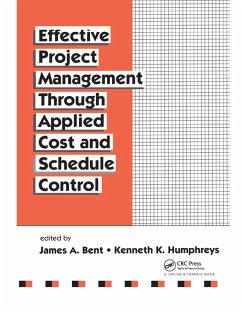
Engineering Project Management
A Quantitative Approach
Versandkostenfrei!
Versandfertig in über 4 Wochen
67,99 €
inkl. MwSt.

PAYBACK Punkte
34 °P sammeln!
Engineering Project Management: A Quantitative Approach introduces students to an assortment of quantitative analysis techniques with emphasis on three key attributes for effective project management: cost analysis, product quality, and time management. The techniques provide individuals with the ability to ensure appropriate quality control by meeting and exceeding customer expectations; complete a project within a given timeframe; and complete a project within given cost constraints. The book is organized into three units. Unit I focuses on cost management and features chapters that cover br...
Engineering Project Management: A Quantitative Approach introduces students to an assortment of quantitative analysis techniques with emphasis on three key attributes for effective project management: cost analysis, product quality, and time management. The techniques provide individuals with the ability to ensure appropriate quality control by meeting and exceeding customer expectations; complete a project within a given timeframe; and complete a project within given cost constraints. The book is organized into three units. Unit I focuses on cost management and features chapters that cover breakeven analysis, the time value of money, benefit cost analysis, and depreciation. Unit II underscores the importance of quality control and familiarizes students with two approaches to ensuring quality: the reactive method and the proactive method. Relevant tools such as control charts, FMEA, QFD, and Ishikawa analysis are presented. In Unit III, students become familiar with the twin methods of the project evaluation review technique (PERT) and the critical path method (CPM), which are essential for effective time management. Both deterministic and probabilistic approaches to CPM are presented. Appendices provide students with a collection of interest rate tables and a normal distribution table. A concise yet enlightening guide, Engineering Project Management is an exemplary resource for courses and programs in engineering.














